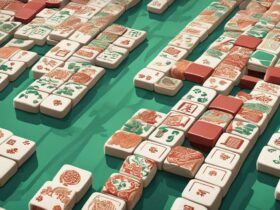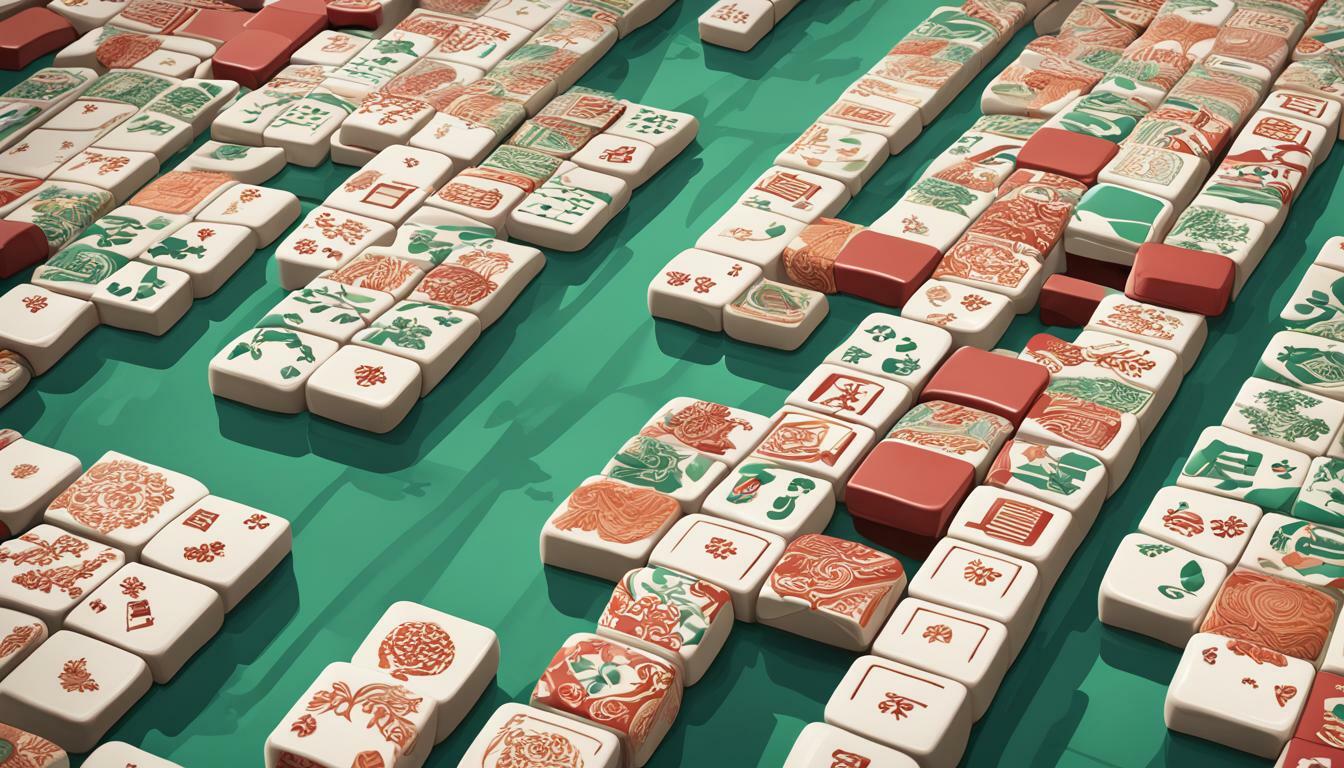Have you ever wondered why Mahjong has become one of the most popular games in the world? Its widespread popularity extends beyond China, where it originated, and has captured the hearts of players across different cultures and continents. In this article, we will explore the reasons behind Mahjong’s enduring appeal and how its addictive gameplay, rich history, and cultural significance have contributed to its popularity.
Key Takeaways
- Mahjong’s popularity is rooted in its addictive gameplay, rich history, and cultural significance.
- The game originated in ancient China and has evolved over time, spreading to other parts of the world.
- Mahjong’s complexity and variety of gameplay options keep players engaged and coming back for more.
- The game’s adaptation to different formats and popular culture appearances have also contributed to its global impact.
A Rich History Rooted in Ancient China
Mahjong is a game with a fascinating history that dates back to the Qing dynasty (1644-1912) in China. There are different theories about the game’s origins, but most historians agree that it was created by a noblewoman named Lady Deng. Legend has it that she developed the game to entertain her husband, who was suffering from a long illness.
Initially, Mahjong was played with a deck of cards, but over time, it evolved into a game played with small tiles made of bamboo, ivory, or bone. By the early 20th century, Mahjong had become a popular pastime in China and was played by people of all ages and social classes. During the 1920s and 1930s, the game spread to other parts of Asia and eventually to the West, where it gained a following among expatriate communities in Shanghai, Hong Kong, and Singapore.
At the heart of Mahjong’s appeal is its cultural significance. The game reflects the values and traditions of Chinese society, such as the importance of family, respect for elders, and the practice of Confucianism. The game’s symbolism and imagery are also deeply rooted in Chinese culture, with tiles featuring dragons, bamboo, and other motifs that hold special meaning for players.
A Game of Strategy, Skill, and Chance
Mahjong is a game that requires a combination of strategy, skill, and luck to win. The objective of the game is to form sets of tiles by drawing and discarding tiles until a player has a complete hand. The game’s complexity and variety of gameplay options keep players engaged and coming back for more.
To master the game, players must carefully consider each move and make strategic decisions about which tiles to keep and which to discard. They must also be aware of the tiles that other players have collected and adjust their strategy accordingly. An element of chance also comes into play, as players must rely on luck to draw the tiles they need to complete their sets.
Despite its challenges, Mahjong is a game that is easy to learn but difficult to master. Its addictive gameplay has contributed to its increasing popularity over the years, with players of all ages and backgrounds drawn to its strategic complexity and the satisfaction of successfully matching tiles.
Mastering the Addictive Gameplay of Mahjong
Experts from w88ok commented. Mahjong’s gameplay is addictive, engaging, and has contributed to the game’s increasing popularity. Its objective is simple – match tiles until none remain on the game board. However, achieving this goal requires strategic thinking, careful planning, and a bit of luck.
The tile-matching gameplay of Mahjong involves selecting two identical tiles and removing them from the game board. However, it’s not that easy, as the tiles must be free and have at least one side unblocked by another tile. When a player successfully matches a pair of tiles, they reveal more tiles and gain opportunities to create new matches. The satisfaction of successfully matching tiles and clearing the board is a big draw for many players.
Mahjong’s complexity adds to the game’s attraction. Variations in rules exist, making the gameplay unique depending on which set of rules players choose to follow. This variety adds to the challenge and keeps the game fresh and exciting for repeated plays. It also keeps players engaged and coming back for more gameplay.
Furthermore, Mahjong’s variety of gameplay options keep players interested. Players can choose to play against the computer, solo, or against other players in real-time online or in-person. This flexibility appeals to different players with varying preferences and levels of skill and availability.
“The satisfaction of successfully matching tiles and clearing the board is a big draw for many players.”
In conclusion, Mahjong’s addictive gameplay and variety of options for play are two of the main reasons why it has become increasingly popular. The satisfaction of playing and continually improving, along with the variety of challenges and formats, make Mahjong a game that players keep coming back to. Its strategic gameplay and options for play appeal to players worldwide
Mahjong’s Global Impact and Modern Adaptations
The appeal of Mahjong extends far beyond its origins in ancient China. Over the years, the game has gained immense popularity around the world, thanks to its addictive gameplay and cultural significance.
Mahjong has been adapted to different formats to cater to players worldwide. With the advent of online gaming and mobile apps, the game’s impact has only grown stronger, allowing players from different corners of the world to enjoy the game together.
| Format | Description |
|---|---|
| Online Mahjong | Players can now enjoy Mahjong in a virtual environment, competing with others from all over the world. Online Mahjong offers various game modes, including single-player and multiplayer options. |
| Mobile Mahjong | Mobile Mahjong apps have made the game easily accessible to everyone with a smartphone. The convenience of being able to play on-the-go has made Mahjong even more popular among younger players. |
| Video Games | Many video games feature Mahjong as a mini-game, attracting a new generation of players to the game. These games often offer new variations of the classic game, keeping it fresh and exciting. |
Mahjong has also made its way into popular culture, appearing in various movies and TV shows. Chinese Mahjong is a staple in many Chinese dramas, showcasing the game’s importance in Chinese culture. In the West, Mahjong has made its way into pop culture, with references in popular TV shows such as “Friends” and “Crazy Ex-Girlfriend.”
In recent years, Mahjong has also become a recognized competitive sport. Tournaments are held worldwide, with cash prizes awarded to the winners. This has contributed to the game’s increasing popularity, attracting more competitive players to the game.
In conclusion, Mahjong’s cultural significance, addictive gameplay, and adaptability have all contributed to its global impact. As the game continues to evolve and adapt to new technologies, it is likely to remain a popular pastime for generations to come.
You may like: Worst Odds in Casino Games: Discover What Game to Avoid
Conclusion
In conclusion, Mahjong’s enduring popularity can be attributed to its rich history, cultural significance, and addictive gameplay. Throughout the centuries, Mahjong has evolved and spread across the world, capturing the hearts of players of all ages and backgrounds.
Its origins in ancient China have given rise to a game that requires strategic thinking, problem-solving skills, and precise execution. The satisfaction of successfully matching tiles and completing sets keeps players coming back for more.
Moreover, Mahjong’s expanding popularity has led to its adaptation into various formats, such as online platforms and mobile apps, which allow players worldwide to enjoy the game. Its appearances in popular culture, such as movies, television shows, and competitive gaming events, have made it an iconic symbol of both traditional and modern gaming culture.
Overall, Mahjong’s popularity shows no signs of fading, and its potential for innovation and evolution ensures that it will continue to captivate players for years to come.
FAQ
Q: Why is Mahjong so popular?
A: Mahjong has gained popularity due to its rich history, cultural significance, and addictive gameplay.
Q: What is the history of Mahjong?
A: Mahjong originated in ancient China and has evolved through different dynasties. It has spread to other parts of the world and has a significant cultural impact.
Q: What makes Mahjong addictive?
A: The addictive gameplay of Mahjong is due to its strategic thinking requirements and the satisfaction players get from successfully matching tiles. Its complexity and variety of gameplay options also keep players engaged.
Q: How has Mahjong made a global impact?
A: Mahjong has been adapted to different formats, including online platforms and mobile apps, allowing players worldwide to enjoy the game. It has also appeared in popular culture, such as movies, television shows, and competitive gaming events.










